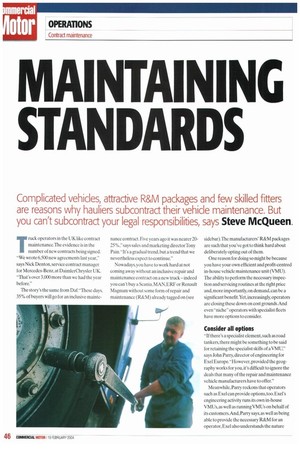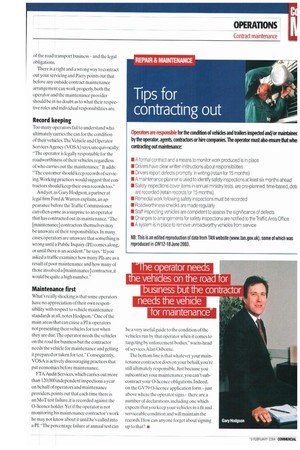MA NIA1141111•41G STANDARDS
Page 48

Page 49

If you've noticed an error in this article please click here to report it so we can fix it.
Complicated vehicles, attractive R&M packages and few skilled fitters are reasons why hauliers subcontract their vehicle maintenance. But you can't subcontract your legal responsibilities, says Steve McQueen.
Truck operators in the UK like contract maintenance. The evidence is in the number of new contracts being signed. "We wrote 6,500 new agreements last year," says Nick Denton, service contract manager for Mercedes-Benz, at DaimlerChrysler UK. "That's over 3,000 more than we had the year before."
The story's the same from Dat"These days, 35% of buyers will go for an inclusive mainte nance contract. Five years ago it was nearer 2025%," says sales and marketing director Tony Pain. "It's a gradual trend, but a trend that we nevertheless expect to continue."
Nowadays, you have to work hard at not coming away without an inclusive repair and maintenance contract on a new truck — indeed you can't buy a Scania,MAN.ERF or Renault Magnum without some form of repair and maintenance (R&M) already tagged on (see sidebar).The manufacturers' R&M packages are such that you've got to think hard about deliberately opting out of them.
One reason for doing so might be because you have your own efficient and profit-centred in-house vehicle maintenance unit (VMU). The ability to perform the necessary inspection and servicing routines at the right price and, more importantly, on demand.can be a significant benefit.Yet, increasingly. operators are closing these down on cost grounds. And even "niche" operators with specialist fleets have more options to consider.
Consider all options
"If there's a specialist element, such as road tankers, there might be something to be said for retaining the specialist skills of aVMU," says John Parry, director of engineering for Exel Europe."However,provided the geography works for you,it's difficult to ignore the deals that many of the repair and maintenance vehicle manufacturers have to offer."
Meanwhile, Parry reckons that operators such as Exel can provide options,too.Exel's engineering activity runs its own in-house VMUs, as well as running VMUs on behalf of its customers.And, Parry says, as well as being able to provide the necessary R&M for an operator. Exel also understands the nature of the road transport business-and the legal obligations.
There is a right and a wrong way to contract out your servicing and Parry points out that before any outside contract maintenance arrangement can work properly, both the operator and the maintenance provider should be in no doubt as to what their respective roles and individual responsibilities are.
Record keeping
Too many operators fail to understand who ultimately carries the can for the condition of their vehicles.The Vehicle and Operator Services Agency (VOSA) says. unequivocally: "The operator is legally responsible for the roadworthiness of their vehicles, regardless of who carries out the maintenance." It adds: The customer should keep records of servicing,Working practices would suggest that contractors should keep their own records too."
And yet, as Gary Hodgson, a partner at legal firm Ford & Warren explains, an appearance before the Traffic Commissioner can often come as a surprise to an operator that has contracted out its maintenance."The [maintenance] contractors themselves may be unaware of their responsibilities. In many cases, operators are unaware that something is wrong until a Public Inquiry (PI) comes along, or until there is an accident," he says.-If you asked a traffic examiner how many Pis are as a result of poor maintenance and how many of those involved a [maintenance] contractor, it would be quite a high number."
Maintenance first
What's really shocking is that some operators have no appreciation of their own responsibility with respect to vehicle maintenance standards at all, notes Hodgson."One of the main areas that can cause a PI is operators not presenting their vehicles for test when they are due.The operator needs the vehicles on the road for business but the contractor needs the vehicle for maintenance and getting it prepared or taken for test." Consequently, VOSA is actively discouraging practices that put economics before maintenance.
PTA Audit Services, which carries out more than 120,000 independent inspections a year on behalf of operators and maintenance providers, points out that each time there is an MoT test failure, it is recorded against the 0-licence holder. Yet if the operator is not monitoring his maintenance contractor's work he may not know about it until he's called into a PI."The percentage failure at annual test can be a very useful guide to the condition of the vehicles run by that operator when it comes to targeting by enforcement bodies," warns head of services Alan Osborne.
The bottom line is that whatever your maintenance contractor does on your behalf, you're still ultimately responsible. Just because you subcontract your maintenance, you can't subcontract your 0-licence obligations. Indeed, on the GV79 0-licence application form -just above where the operator signsthere are a number of declarations, including one which expects that you keep your vehicles in a fit and serviceable condition and will maintain the records. How can anyone forget about signing up to that? •






































































































































































































